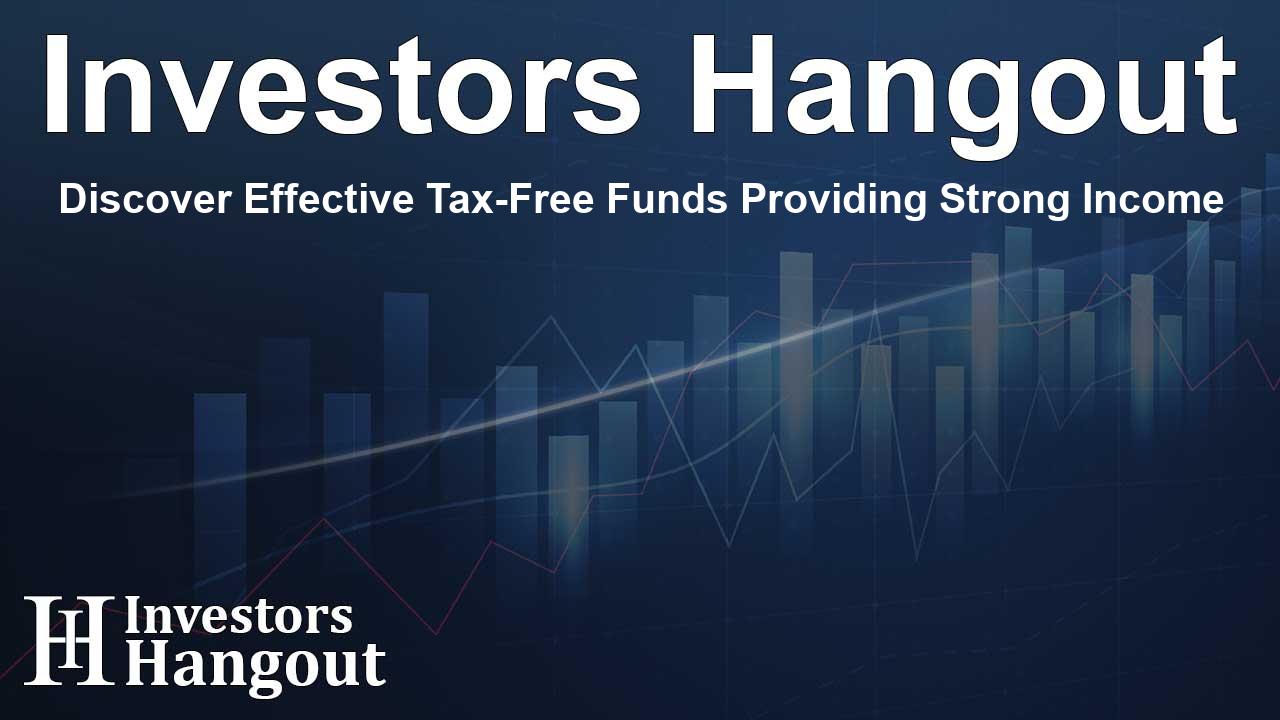Discover Effective Tax-Free Funds Providing Strong Income

Tax-Efficient Investment Strategies for Income Seekers
Investing wisely can help you keep more of your hard-earned money. One effective method is to focus on a special category of funds that offer dividends shielded from taxes. These investments can provide a reliable stream of income, making them an attractive option for those looking to grow their portfolios while minimizing tax liabilities.
Municipal bonds are a cornerstone of tax-free investing. They play a pivotal role in funding significant public projects and can offer income that remains untaxed for the majority of investors. Incorporating municipal bond funds can yield impressive returns while avoiding hefty tax bills.
Understanding the Benefits of Municipal Bonds
The salient feature of municipal bonds lies in their tax-exempt status—something that can substantially increase your effective yield. For instance, a municipal bond providing a 4% return translates into a taxable equivalent yield of approximately 6.6% for high-income earners. As these yields rise, the potential for tax-equivalent returns increases significantly, making them appealing.
The Power of Closed-End Funds (CEFs)
Closed-end funds (CEFs) offer a strategic way to invest in municipal bonds. They provide unique advantages that individual investors may find challenging to replicate:
- Expert Management: CEFs are managed by professionals who navigate the complexities of the municipal bond market, ensuring that your investments are handled by experienced teams.
- Competitive Yields: Many CEFs offer yields that exceed 4% or 5%, which means you’re likely to achieve more remarkably favorable taxable-equivalent yields.
- Discounted Pricing: CEFs often trade below their net asset value (NAV), providing an opportunity to acquire municipal bonds at lower costs, enhancing overall returns.
Top Municipal Bond Funds to Consider
Let’s explore three distinct municipal bond CEFs that are well-regarded in this investment category, each with unique attributes and strong performance histories.
1. BlackRock MuniYield Quality Fund (MQY)
The BlackRock MuniYield Quality Fund (NYSE: MQY) is celebrated for its robust long-term performance. Currently, it trades at a 7% discount to NAV, allowing you to pay less than a dollar for assets worth more. This fund yields about 5.9%, providing substantial tax-free income that translates into impressive returns for high-income earners—nearly 9.8% on a taxable-equivalent basis.
2. Nuveen AMT-Free Quality Municipal Income Fund (NEA)
The Nuveen AMT-Free Quality Municipal Income Fund (NYSE: NEA) is another strong contender, known for accessing high-quality bond issuances early due to its robust industry connections. Currently, it offers an enticing yield of 7.6%, thanks in large part to higher rates that have benefitted its performance over time. Like MQY, NEA is trading at a discount, making it an appealing choice for tax-free income.
3. RiverNorth Managed Duration Municipal Income Fund II (RMMZ)
For added diversification, consider the RiverNorth Managed Duration Municipal Income Fund II (NYSE: RMMZ). This fund employs a strategic approach, adjusting its portfolio dynamics based on market conditions, and is also traded at a discount of 7.4%. An impressive yield of 7.2% equates to around 12% on a taxable-equivalent basis for top earners. Furthermore, its NAV discount has recently been decreasing, which opens the potential for capital appreciation.
The Conclusion: A Strategic Approach to Income Investing
In summary, focusing on tax-efficient, income-generating investments can significantly impact your overall financial well-being. Municipal bond funds such as those highlighted are valuable additions to any investment strategy, offering strong yields while ensuring that investors can maximize their take-home earnings. With minimal default rates in the municipal bond space, the security and potential upside of these funds present a compelling case for their consideration.
Frequently Asked Questions
What are municipal bonds?
Municipal bonds are debt securities issued by local or state governments to finance public projects. Their income often remains exempt from federal taxes, making them appealing to investors.
How do taxable-equivalent yields work?
Taxable-equivalent yields provide insight into what a tax-free yield is worth when compared to taxable investments. They help assess the true value of tax-free returns.
What is a closed-end fund?
A closed-end fund is a pooled investment vehicle that raises capital through an initial public offering and then trades on an exchange, usually at prices different from its NAV.
Why might investors prefer CEFs for municipal bonds?
Investors often prefer CEFs for municipal bonds due to professional management, competitive yields, and the opportunity to purchase shares at a discount to NAV.
Are there risks associated with investing in municipal bond funds?
While municipal bond funds are generally considered lower-risk investments, they can still be affected by interest rate fluctuations, credit risk, and market conditions.
About The Author
Contact Ryan Hughes privately here. Or send an email with ATTN: Ryan Hughes as the subject to contact@investorshangout.com.
About Investors Hangout
Investors Hangout is a leading online stock forum for financial discussion and learning, offering a wide range of free tools and resources. It draws in traders of all levels, who exchange market knowledge, investigate trading tactics, and keep an eye on industry developments in real time. Featuring financial articles, stock message boards, quotes, charts, company profiles, and live news updates. Through cooperative learning and a wealth of informational resources, it helps users from novices creating their first portfolios to experts honing their techniques. Join Investors Hangout today: https://investorshangout.com/
The content of this article is based on factual, publicly available information and does not represent legal, financial, or investment advice. Investors Hangout does not offer financial advice, and the author is not a licensed financial advisor. Consult a qualified advisor before making any financial or investment decisions based on this article. This article should not be considered advice to purchase, sell, or hold any securities or other investments. If any of the material provided here is inaccurate, please contact us for corrections.
